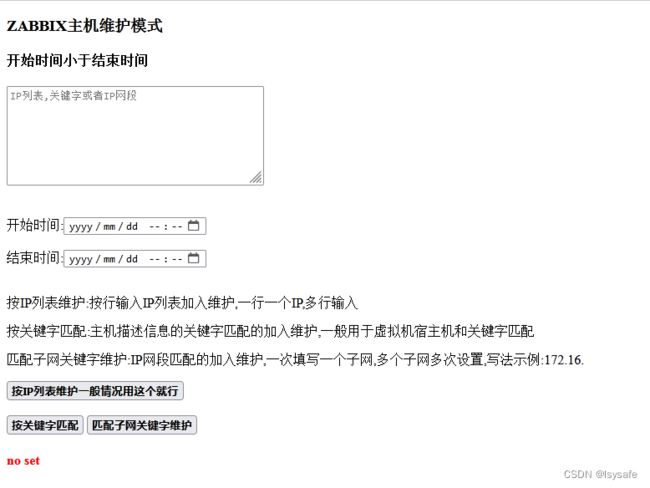ZABBIX根据IP列表,主机描述,或IP子网批量创建主机的维护任务
有时候被ZABBIX监控的主机可能需要关机重启等维护操作,为了在此期间不触发告警,需要创建主机的维护任务,以免出现误告警
ZABBIX本身有这个API可供调用(不同版本细节略有不同,本次用的ZABBIX6.*),实现批量化建立主机的维护任务
无论哪种方式(IP列表,主机描述,或IP子网)创建维护,都是向maintenance.create这个方法传递参数的过程,除了起始和终止的时间,最主要的一个参数就是hostids这个参数,它是一个列表(也可以是单个hostid)
def create_host_maintenance(self,names,ips,starttimes,stoptimes):
starts=self.retimes(starttimes)
stops=self.retimes(stoptimes)
data = json.dumps({
"jsonrpc":"2.0",
"method":"maintenance.create",
"params": {
"name": names,
"active_since": starts,
"active_till": stops,
#"hostids": [ "12345","54321" ],
"hostids": ips,
"timeperiods": [
{
"timeperiod_type": 0,
"start_date": starts,
#"start_time": 0,zabbix6不用这个参数,低版本的有用
"period": int(int(stops)-int(starts))
}
]
},
"auth": self.authID,
"id": 1,
})
request = urllib2.Request(self.url, data)
for key in self.header:
request.add_header(key, self.header[key])
try:
result = urllib2.urlopen(request)
except URLError as e:
print "Error as ", e
else:
response = json.loads(result.read())
result.close()
print "maintenance is created!"
1.简单说明hostids这个列表参数产生的过程
按IP列表产生hostids的LIST,并调用方法创建维护
def djmaintenanceiplist(self,ipliststr="strs",area="none",byip="none"):
lists = []
if area=="none": #通过IP列表来创建维护,只向函数传递ipliststr这个参数,其它参数为空
for line in ipliststr.splitlines():
con = line.split()
ipaddr = con[0].strip()
hostids = self.host_getbyip(ipaddr)
if hostids != "error" and hostids not in lists:
lists.append(hostids)
return lists
else:
if area !="ip" and ipliststr != "strs": #按主机描述匹配创建维护,ipliststr参数因定为strs,area参数为主机描述,byip参数为空(因为网络环境的原因,本例弃用这个条件)
sqls="select hostid from zabbixdb.hosts where name like '%"+area+"%' "
tests=pysql.conn_mysql()
datas=tests.query_mysqlrelists(sqls)
if datas != "error":
for ids, in datas:
if ids not in lists:
lists.append(ids)
else:
if byip != "none": #按主机IP子网创建维护,byip参数不为空(因为网络环境的原因,本例弃用这个条件)
sqls = "select hosts.hostid from zabbixdb.hosts,zabbixdb.interface where `hosts`.hostid=interface.hostid and (interface.ip like '%" + byip + "%' or hosts.name like '%" + byip + "%')"
tests = pysql.conn_mysql()
datas = tests.query_mysqlrelists(sqls)
if datas != "error":
for ids, in datas:
if ids not in lists:
lists.append(ids)
return lists
def djiplist(self,starttime,stoptime,strlins): #strlins为IP列表的参数,可由WEB前端传递进来
test = ZabbixTools()
test.user_login()
lists = test.djmaintenanceiplist(strlins)
nowtime = str(time.strftime('%Y-%m-%d-%H-%M-%S', time.localtime(time.time())))
test.create_host_maintenance(nowtime, lists, starttime, stoptime)
按主机描述和IP子网产生hostids的LIST,并调用方法创建维护
def djdescript(self,starttime,stoptime,descstr,ipnets="none"):
lists = []
if descstr != "ip": #descstr参数不为ip的时候,表示根据主机的描述信息匹配创建维护,此时不传递innets参数
for line in descstr.splitlines():
con = line.split()
descstrnew = con[0].strip()
sqls = "select hostid from dbname.hosts where name like '%" + descstrnew + "%' "
tests = pysql.conn_mysql()
datas = tests.query_mysqlrelists(sqls)
if datas != "error":
for ids, in datas:
if ids not in lists:
lists.append(ids)
else:
if ipnets != "none": #ipnets参数不为空,表示按照IP子网匹配创建维护,此时descstr参数一定为"ip"
sqls = "select hosts.hostid from dbname.hosts,dbname.interface where `hosts`.hostid=interface.hostid and (interface.ip like '%" + ipnets + "%' or hosts.name like '%" + ipnets + "%')"
tests = pysql.conn_mysql()
datas = tests.query_mysqlrelists(sqls)
if datas != "error":
for ids, in datas:
if ids not in lists:
lists.append(ids)
test = ZabbixTools()
test.user_login()
nowtime = str(time.strftime('%Y-%m-%d-%H-%M-%S', time.localtime(time.time())))
test.create_host_maintenance(nowtime, lists, starttime, stoptime)
2.create_host_maintenance和djmaintenanceiplist,及djdescript函数调用方法的说明
时间转换函数self.retimes,将用户传递/的"%Y-%m-%d %H:%M:%S"日期时间转换为时间时间戳
def retimes(self,times):
timeArray = time.strptime(times, "%Y-%m-%d %H:%M:%S")
timestamp = time.mktime(timeArray)
return timestampself.host_getbyip(ipaddr)通过主机IP获取zabbix的hostid,这个方法应用很广泛
函数中的self.authID通过zabbix的API 的"user.login"方法获取,参考ZABBIX官方文档
def host_getbyip(self,hostip):
data = json.dumps({
"jsonrpc":"2.0",
"method":"host.get",
"params":{
"output":["hostid","name","status","available"],
"filter": {"ip": hostip,"custom_interfaces":0}
},
"auth":self.authID,
"id":1,
})
request = urllib2.Request(self.url, data)
for key in self.header:
request.add_header(key, self.header[key])
try:
result = urllib2.urlopen(request)
except URLError as e:
if hasattr(e, 'reason'):
print 'We failed to reach a server.'
print 'Reason: ', e.reason
elif hasattr(e, 'code'):
print 'The server could not fulfill the request.'
print 'Error code: ', e.code
else:
response = json.loads(result.read())
result.close()
lens=len(response['result'])
if lens > 0:
return response['result'][0]['hostid']
else:
print "error "+hostip
return "error"pysql.conn_mysql()的实现
#coding:utf-8
import pymysql
class conn_mysql:
def __init__(self):
self.db_host = 'zabbixdbip'
self.db_user = 'dbusername'
self.db_passwd = 'dbuserpassword'
self.database = "dbname"
def query_mysqlrelists(self, sql):
conn = pymysql.connect(host=self.db_host, user=self.db_user, passwd=self.db_passwd,database=self.database)
cur = conn.cursor()
cur.execute(sql)
data = cur.fetchall()
cur.close()
conn.close()
#print data
# 查询到有数据则进入行判断,row有值且值有效则取指定行数据,无值则默认第一行
if data != None and len(data) > 0:
return data
#调用方式:for ids, in datas:
else:
return "error"
#此方法返回的数据不含数据库字段的列表,如果要返回包含列名(KEY)的字典列表,则:conn = pymysql.connect(host=self.db_host, user=self.db_user, passwd=self.db_passwd,database=self.database,cursorclass=pymysql.cursors.DictCursor) 解决:tuple indices must be integers, not str
3.VIEWS.PY及前端和前端伟递参数的说明
views.py对应的方法
#@login_required
def zabbixmanage(request):
if request.method=="POST":
uptime = request.POST.get('uptime')
downtime= request.POST.get('downtime')
UTC_FORMAT = "%Y-%m-%dT%H:%M"
utcTime = datetime.datetime.strptime(uptime, UTC_FORMAT)
uptime = str(utcTime + datetime.timedelta(hours=0))
utcTime = datetime.datetime.strptime(downtime, UTC_FORMAT)
downtime = str(utcTime + datetime.timedelta(hours=0))
if request.POST.has_key('iplists'):
try:
sqlstr=request.POST.get("sqlstr")
u1=upproxy.ZabbixTools() #前面的python文件名为upproxy.py,类名为ZabbixTools
u1.djiplist(uptime,downtime,sqlstr)
except Exception:
return render(request,"zbx1.html",{"login_err":"FAILSTEP1"})
if request.POST.has_key('descs'):
try:
sqlstr = request.POST.get("sqlstr")
u1 = upproxy.ZabbixTools()
u1.djdescript(uptime,downtime,sqlstr)
except Exception:
return render(request,"zbx1.html",{"login_err":"FAILSTEP2"})
if request.POST.has_key('ipnets'):
try:
sqlstr = request.POST.get("sqlstr")
u1 = upproxy.ZabbixTools()
u1.djdescript(uptime,downtime,"ip",sqlstr)
except Exception:
return render(request,"zbx1.html",{"login_err":"FAILSTEP3"})
HTML的简单写法,不太会写,很潦草
ZABBIXMANAGE
ZABBIX主机维护模式
开始时间小于结束时间
跑起来大约是这个界面,用户填写主机IP列表,或匹配的描述,或子网的信息,选好时间,点个按钮就能实现批量的维护任务
